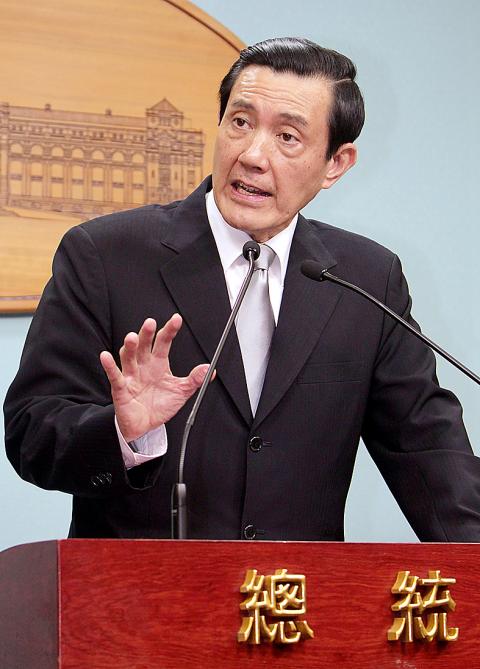President Ma Ying-jeou (馬英九) yesterday said that poor communication in explaining major policies to the public had given rise to public discontent and that he should include more public input in formulating policies.
In an impromptu press conference held at the Presidential Office following a protest organized by opposition parties yesterday, Ma said he accepted people’s dissatisfaction with government policies and promised to improve the administration’s performance during his second term.
“Today and tomorrow, people will be expressing discontent over our policies outside the Presidential Office, and I am here to express my willingness to listen to their grievances and make whatever improvements are necessary,” Ma said.

Photo: CNA
He listed four areas where he too was unhappy with the government’s performance, including the number of jobs created, the unemployment rate, the low increase in average salaries and the wealth gap.
The president promised to work harder to improve people’s lives during his second term.
Government information shows that over the past four years, unemployment has increased from 3.84 percent to 4.17 percent. The average monthly salary has gone up by NT$1,500 compared with four years ago, while the wealth gap has narrowed from a factor of 6.34 to 6.19.
“We have also failed to explain policies to the public clearly and caused public confusion ... There are some reforms that cannot wait, but we will take the interests of the majority into consideration when making policy decisions. We will try harder to meet the public’s expectations,” Ma said.
Facing public outrage over government policies from US beef imports to the increase in electricity and fuel prices, Ma said his efforts to push ahead with reform would inevitably be met with disapproval and criticism from some, but promised to pay closer attention to popular sentiment in the policymaking process in the future.
“I have said on many occasions that I am sorry these policies have caused inconvenience and unease to so many. We will respect the views of the people and the rights of the majority,” he said.
Ma expressed regret on Friday in response to growing public discontent over both his leadership and government policy. However, he stopped short of offering a formal apology in the face of opposition leaders calling on him to issue a public apology.
He spent most of the 30-minute press conference yesterday defending the policymaking process when questioned by journalists about his administration’s communication with the public and numerous flip-flops on policy decisions.
Ma denied the government has succumbed to pressure from the US in planning to relax the ban on imports of US beef containing traces of the feed additive ractopamine, while stressing the need to increase electricity and fuel prices to better reflect market costs.
“I have never denied that there has been pressure from the US [on the beef imports issue], but we have made no promises on the schedule or scope [of US beef imports],” said Ma, who was re-elected on Jan. 14 and is to be sworn in for his second term this morning.

The CIA has a message for Chinese government officials worried about their place in Chinese President Xi Jinping’s (習近平) government: Come work with us. The agency released two Mandarin-language videos on social media on Thursday inviting disgruntled officials to contact the CIA. The recruitment videos posted on YouTube and X racked up more than 5 million views combined in their first day. The outreach comes as CIA Director John Ratcliffe has vowed to boost the agency’s use of intelligence from human sources and its focus on China, which has recently targeted US officials with its own espionage operations. The videos are “aimed at

STEADFAST FRIEND: The bills encourage increased Taiwan-US engagement and address China’s distortion of UN Resolution 2758 to isolate Taiwan internationally The Presidential Office yesterday thanked the US House of Representatives for unanimously passing two Taiwan-related bills highlighting its solid support for Taiwan’s democracy and global participation, and for deepening bilateral relations. One of the bills, the Taiwan Assurance Implementation Act, requires the US Department of State to periodically review its guidelines for engagement with Taiwan, and report to the US Congress on the guidelines and plans to lift self-imposed limitations on US-Taiwan engagement. The other bill is the Taiwan International Solidarity Act, which clarifies that UN Resolution 2758 does not address the issue of the representation of Taiwan or its people in

US Indo-Pacific Commander Admiral Samuel Paparo on Friday expressed concern over the rate at which China is diversifying its military exercises, the Financial Times (FT) reported on Saturday. “The rates of change on the depth and breadth of their exercises is the one non-linear effect that I’ve seen in the last year that wakes me up at night or keeps me up at night,” Paparo was quoted by FT as saying while attending the annual Sedona Forum at the McCain Institute in Arizona. Paparo also expressed concern over the speed with which China was expanding its military. While the US

SHIFT: Taiwan’s better-than-expected first-quarter GDP and signs of weakness in the US have driven global capital back to emerging markets, the central bank head said The central bank yesterday blamed market speculation for the steep rise in the local currency, and urged exporters and financial institutions to stay calm and stop panic sell-offs to avoid hurting their own profitability. The nation’s top monetary policymaker said that it would step in, if necessary, to maintain order and stability in the foreign exchange market. The remarks came as the NT dollar yesterday closed up NT$0.919 to NT$30.145 against the US dollar in Taipei trading, after rising as high as NT$29.59 in intraday trading. The local currency has surged 5.85 percent against the greenback over the past two sessions, central